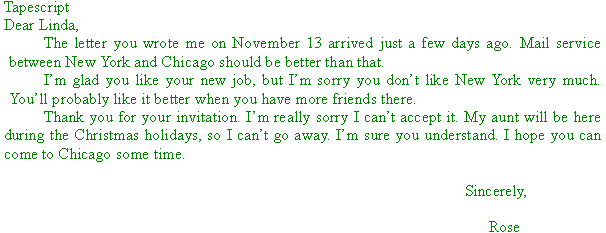Lesson Fourteen APOLOGIES(II)
|
|
Part B: Macro-Listening
Suppose you are looking for somebody
in a strange place, how should you make an inquiry in English?
The following dialogue will inform us of this subject.
Now, let's start.
|
| Dialogue Do
You Know That Name? |
 Words
and phrases Words
and phrases
apartment /E5pB:tmEnt/
公寓
California /kAlI5fC:njE/加利福尼亚州
mailbox /meIlbRks/
邮箱
Jackie Hunter 人名 |
I. Learning Points: 
 |
Key
|
 |
| 1) c 2) d 3) d 4) a 5) a |
Tapescript
Man Excuse me. Do you live here?
Woman Yes, we do. We live on the third floor.
Man Oh. Does Jackie Hunter live here, too?
Woman Jackie Hunter? Do you know that name, Tom?
Tom Jackie hunter? No, I don't. I'm sorry.
Betty I know her!
Tom Do you? Does she live here?
Betty Yes, she does. She's from California.
She lives under
us. She lives in the apartment on the second
floor.
Man Oh, thanks, I have a letter for her, but
her name isn't
on the mailbox. |
|
Listen
carefully. You will hear one word read from each group. Repeat
what you hear. Then underline the letter beside the word you
hear. (10 points) |
1)a. Two.
b. Three.
c. Four.
d. Five.
2)a. A policeman.
b. A taxi driver.
c. A reporter.
d. A mailman.
3)a. Coming to visit Jackie Hunter.
b. Making an investigation of Jackie Hunter.
c. Making a survey.
d. Delivering a letter to Jackie Hunter.
4)a. In an apartment house.
b. At a hotel.
c. At a post office.
d. In the street.
5)a. Jackie Hunter should have put her name on her mailbox.
b. Nobody in the apartment knows Jackie Hunter.
c. Jackie Hunter is sociable.
d. Jackie Hunter has just moved here. |
II.
Direction: 
 |
Key
|
 |
1) She lives in the apartment on
the third floor.
2) She lives in the apartment on the second floor.
3) She is from California.
4) No, he doesn't.
5) Because she didn't put her name on it. |
|
Listen to the dialogue again and answer the following questions.
(10 points) |
1) Where does the woman live?
_________________________________________________________.
2) Where does Jackie Hunter live?
_________________________________________________________.
3) Where is Jackie Hunter from?
_________________________________________________________.
4) Does the first speaker know Jackie Hunter?
_________________________________________________________.
5) Why can't the first speaker find Jackie's mailbox?
_________________________________________________________. |
(In this part, we will focus
on how to decline one's invitation. Generally an invitation
should be answered as soon as possible. If you can't accept
the invitation, you should state clearly your reasons.
The following passage will tell us this topic. Let's listen
carefully and do the exercises.)
Passage
Sorry, I Can't Accept It |
| I. Learning
Points |
 Words
and phrases Words
and phrases
accept /Ek5sept/
接受
Christmas /5krIsmEs/
圣诞节
service /5s\:vIs/
服务
Chicago /FI5kB:^EJ/
芝加哥
aunt /B:nt; /
姨,婶
Rose /5rEJz/
人名 |
Basic Structures
Useful Expressions
1) I’m glad…
Thank you very much for your invitation
2)
I’m sure…
3) I hope… |
|
II. Exercises:
 |
Key
|
 |
1) Mail service between New York
and Chicago is not very good. ( T )
2) Linda likes New York very much, but she doesn't
like her new job. ( F )
3) Linda doesn't have many friends in New York.
( T )
4) Rose can't accept Linda's invitation because
she's decided to visit her aunt. ( F )
5) Linda is writing to Rose to thank her for the
invitation. ( F ) |
|
1.Directions  Listen
to the passage carefully and write “T”(true) or “F”(false) for
each statement you hear.
(10 points) Listen
to the passage carefully and write “T”(true) or “F”(false) for
each statement you hear.
(10 points)  |
| 1) ( )
2) ( ) 3) (
) 4) ( )
5) ( ) |
2. Directions

 |
Key
|
 |
| 1)
b 2) a
3) c 4) d
5) b

|
|
Listen to the passage again and choose the best answer to complete
each of the following.
(10 points) 
|
1) Linda wrote to Rose on _______________.
a. September 30th
b. November 13th
c. November 30th
d. December 13th
2) Rose received the letter _______________.
a. a few days ago
b. two days ago
c. three days ago
d. a few weeks ago
3) Rose is now _______________.
a. visiting her friends in New York
b. with her aunt in New York
c. in Chicago
d. visiting her aunt in Chicago
4) The letter mainly tells us _________________.
a. Rose's aunt will come for a visit at Christmas
b. Rose hopes that Linda will come to visit her some day
c. Rose's aunt will come to New York
d. Rose can't join Linda for Christmas
5) It is suggested in the passage that __________________.
a. Rose is very grateful to Linda for her invitation
b. Linda has not been living in New York for long
c. Rose hopes Linda can come to Chicago for Christmas
d. Linda likes Chicago better than New York |